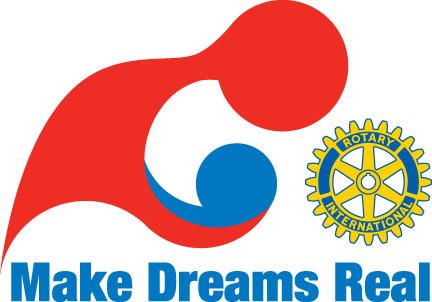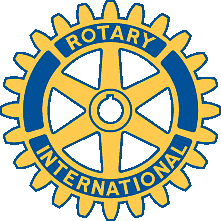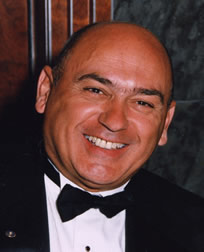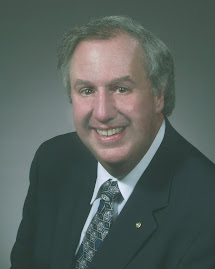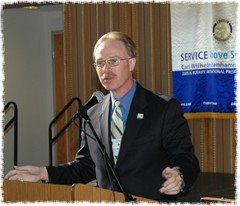ECONOMY
We’re hearing reports that some areas of
This is one of those critical times to work together. I'm asking seven things of you..........
1. Please check the district records to see if the economic situation is affecting membership numbers in your district. Are there areas that are being particularly hard hit? Industries that are being affected?
2. Talk with the clubs about sensitivity to those who might be feeling the pinch because of company cutbacks. Offer ways to help the clubs identify those who may potentially leave and be sure those members feel their membership has value and a special meaning to them - i.e. engagement and involvement. (Businesses may also begin to cut expenses and may not subsidize their employee's dues and/or sponsorship of Rotary events. This could have a huge effect on our clubs. )
3. Consider the "New Generations" or “After Five” model in setting up new clubs, which can mean a less expensive approach to meals and venue. Some clubs may also wish to consider converting to this model.
4. Be creative! Dues are not the big expense – food, fines and contributions tend to be what our members find expensive. Consider some of the following:
· 5th meeting of the month – “brown bag” at the business of one of the members – make it a Vocational Day.
· Meet and eat with Interact Club at school – good for connection and communication with our young future Rotarians and school lunches are cheap!
· Picnic at a local park during the summer.
· Are there less expensive meeting venues? How about Churches or other town meeting halls? Meals can be “brown bag” or Sub sandwiches.
· Talk with the restaurant about simpler lunches, i.e. soup and sandwich.
· Re-evaluate “fining.” Ask each member twice a year for their estimate of personal club fines for that period. Encourage “Happy Dollars” as an alternative.
· Look for hands-on projects to give members alternatives to just writing checks.
· Consider setting up “Rotary First Harvest” as a district/club project – great for hands-on and community involvement.
· Consider joint project with
· Big Foundation Gala a tradition? Consider instead a “Subsistence” Dinner (based on a typical
5. Friendship and socializing is an important part of Retention. Plan simple monthly events, i.e. “First Friday” – keep it inexpensive and be creative.
- BYOB drinks and appetizers
- Potluck dinners
- Desserts and games
- Super Bowl Chili Party at one of members’ home (or several homes if your club is larger.)
- Mystery dinners
- High School ball games
- Costume parties
- Access to a farm? Hayrides, barn dance
- Pumpkin Carving party
- Christmas Tree cutting with hot cocoa and cookies afterward
- Divide into 12 groups and each group draws a month for which they’re responsible in coming up with a fun and inexpensive social event.
6. Keep your radar tuned to any signs of difficulty.
7. Call on me for assistance, information or ideas -- that's my job!
If we approach this in a proactive way, we may cause a member to put resigning from Rotary or cutting on Foundation giving further down on that list of where they will cut corners!
An idea to counteract attrition from D5160:
Concord CA Rotary has set up a program called "Shoulder to Shoulder" for proven (their word) Rotarians who have fallen on hard times. The term is six months, renewable one time for another six months. Dues and meal costs are waived, in turn the Rotarian has to commit to attendance and participation in club projects and activities. The thought is that the loyalty will be rewarded when the participants get back on their feet.
